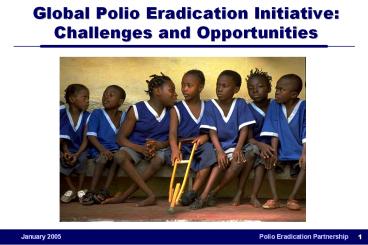Global Polio Eradication Initiative: Challenges and Opportunities - PowerPoint PPT Presentation
1 / 10
Title:
Global Polio Eradication Initiative: Challenges and Opportunities
Description:
... polio funding: in 2005 Central African Republic, Chad, C te d'Ivoire are eligible ... African Union heads of state meeting and communiqu to further commit ... – PowerPoint PPT presentation
Number of Views:444
Avg rating:3.0/5.0
Title: Global Polio Eradication Initiative: Challenges and Opportunities
1
Global Polio Eradication InitiativeChallenges
and Opportunities
2
Polio Eradication on the African Continent
Summary points
- Polio continues to spread in West and Central
Africa where vaccination coverage is
insufficient, and continues to circulate in Egypt
despite increasing numbers of campaigns causing
risks to polio eradication - National immunization days are not achieving the
quality necessary to protect sufficient numbers
of children to stop polio transmission - Surveillance of acute flaccid paralysis not
detecting all cases - Additional risks to completing polio eradication
during 2005 - Failing to contain the spread of polio virus from
its reservoir in Nigeria/Niger - Failing to re-start immunization activities in
Côte d'Ivoire - Perception of insufficient government commitment
or failure to progress by donors, leading to
decreased resources
3
African Union Heads of State SummitAbuja, 30-31
January 2005
- Convened by President Obasanjo
- Two hour agenda item on health AIDS,TB,
malaria and polio - Polio partners proposing communiqué on polio
- Opportunity to increase commitment and funding of
G8, OIC, OECD and national governments
October launch, synchronized National immunizatio
n days,
West and Central Africa
4
Increasing Country-level commitment and
effectiveness
- Public health system alone is insufficient to
provide logistics and staffing necessary for
reaching every child with polio vaccine - Commitment from health and other necessary
government sectors can be increased - Country-level advocacy meetings bringing all
national partners together with minister or other
high level officials - Regularly informing head of state and ministry of
foreign affairs on polio situation through
monthly reports in cabinet
5
Independent monitoring of vaccination campaigns
and surveillance activities
- Polio virus will not disappear as rapidly as
vaccination coverage increases - Surrogate information that will demonstrate
effective eradication activities - Surveillance for acute flaccid paralysis that
meets international standards including
timeliness of laboratory analysis and reporting - Independent monitoring data that demonstrate
actual numbers of children vaccinated/missed in
addition to vaccine tally sheets - National commitment as demonstrated by government
officials launching campaigns, and by television
spots and media coverage
6
Example NID Monitoring Data children und un-immunized
Oct 2004
Nov 2004
NOTE 41,000 children checked
7
Local Resource Mobilization
- Increasing funds required in 2004 and 2005
because of spread of polio virus to countries
with low polio vaccination coverage - Local resource mobilization for polio compliments
funding from WHO and UNICEF in many African
countries where - Government commitment is demonstrated by national
budget allocations for polio have facilitated
bilateral fund-raising - UN Consolidated Appeal Process (CAP) is
applicable for emergency polio funding in 2005
Central African Republic, Chad, Côte d'Ivoire are
eligible - UNICEF, Rotary and WHO can provide support
through ICC and other national mechanisms
8
THE CHALLENGE FOR 2004
- Increase the quality of vaccination campaigns
and strengthen surveillance for acute flaccid
paralysis, interrupting transmission of wild
polio virus while maintaining donor confidence
and the necessary resource-base.
9
Opportunities in polio eradication 2005
- African Union heads of state meeting and
communiqué to further commit national
governments, G8, OIC, OECD, others - Increasing country level commitment and
effectiveness through advocacy meetings and
regular head of state briefing - Independent monitoring of vaccination campaigns
and surveillance to increase effectiveness and
donor confidence - Local resource mobilization to maximize funding
for polio eradication activities
10
African Ministers of Health Meeting on Polio
Eradication, 13 January 2005
- We, the Ministers of Health of the 8 most
severely polio-affected countries of Africa,
supported by the polio partners, resolve to
further intensify eradication activities, with
the goal of stopping polio in 2005 by - conducting at least 5 rounds of synchronized
polio campaigns, - mobilizing the full resources of government
local communities to ensure there are sufficient
people transport to reach every child in each
campaign. - restarting sustaining polio campaigns in all
polio-infected high risk areas. - personally monitoring the quality of each
campaign and of surveillance.






























